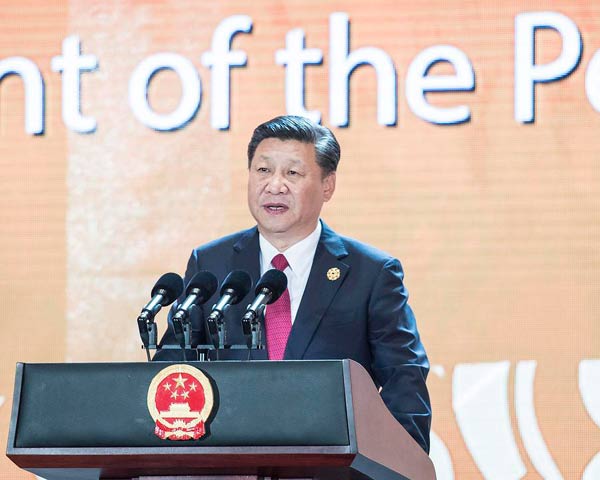Fulfilling domestic as well as global goals
By Wang Yiwei | China Daily | Updated: 2017-11-24 09:40

President Xi Jinping has returned from his first overseas trip after the 19th National Congress of the Communist Party of China in October. The last leg of his trip took him to Laos, and before that he attended the 25th Asia-Pacific Economic Cooperation Economic Leaders' Meeting in Da Nang, Vietnam, as well as paid a state visit to Vietnam.
While addressing the APEC CEO meeting, Xi emphasized the need to "uphold justice while pursuing shared interests", saying the dream of the Chinese people is closely connected with the dreams of the peoples of other countries, and the Chinese Dream can be realized only in a peaceful global environment and stable world order. He had used pretty much the same words in his speech at the 19th Party Congress while offering a glimpse into the "hybrid identities" of the country-traditional, modern and global.
Today's China is committed to socialism with Chinese characteristics in the new era and is a leading developing and emerging country. So while making efforts to realize the Chinese Dream of national rejuvenation, China will "keep in mind both our internal and international imperatives" and pursue common prosperity at home and sustainable development globally.
As a major country, China also feels the urge to help other developing countries see the flaws of "universal models" and thus find their own development path and work together to develop a more inclusive global order.
Its multiple identities are what make China unique in global governance-a peacekeeper, an economic contributor and a guardian of the world order. By including a community with a shared future for mankind, the pledge to uphold justice while pursuing shared interests, and the Belt and Road Initiative in the amended Party Constitution, the central leadership has made clear that China is dedicated to a reciprocal, win-win diplomatic approach.
The promise to uphold justice while pursuing shared interests, in particular, serves as a key diplomatic principle for "Xi Jinping Thought on Socialism with Chinese Characteristics for a New Era". The fundamental thought of Xi, also general secretary of the CPC Central Committee, was included in the Party guiding principles at the 19th Party Congress.
The Party is committed to ensuring the well-being of the Chinese people and human progress, while making new and greater contributions to humankind is the Party's abiding mission, Xi said in his report to the 19th Party Congress. Attaching equal importance to "justice" and "shared interests", which originate from Chinese moral codes, is proof that the Party has never forgotten the basic reason why it was formed.
The Party does not believe in just paying lip service to its commitments. China has actively developed global partnerships and expanded the convergence of interests with other countries while working with them to build a framework for major country relations featuring overall stability and balanced development.
By highlighting the principle of amity, sincerity, mutual benefit and inclusiveness in its neighborhood diplomacy, China has enshrined both win-win cooperation and humanitarian assistance in its foreign policy while engaging with other countries, especially the least developed ones, to help build a better world. It has also doubled its efforts to fight climate change and promote internet-driven innovations. In other words, its diplomatic goals are not just about securing national interests but also about shouldering global responsibilities.
The author is Jean Monnet chair professor at and director of the Institute of International Affairs, Renmin University of China.
























